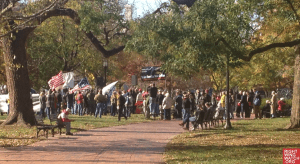1. The “millions” of white patriots and tea partiers Larry Klayman summoned to Washington to overthrow the secret-Muslim Black President turned out to be a bit less than a hundred people, putting a damper on his plans for a “Second American Revolution.”
2. Jay Lake and BLDG Blog direct us to the eerie beauty of Louis Helbig’s Sunken Villages project. “July 1, 1958 is remembered as Inundation Day in the region near Cornwall, Ontario. At 08:00 a controlled explosion tore open a cofferdam and four days later an area that had been home to 7,500 people disappeared under the waves of Lake St. Lawrence, part of the newly created St. Lawrence Seaway.” Wow.

3. Hännah Ettinger of Wine & Marble writes about the evangelical obsession with probing and policing the divorced to discern if they had “biblical grounds.” It’s another sharp perspective on what I wrote here last month about “The ugly little game of white evangelical divorce.” Again, I think whenever this interrogation comes up — posed, as Hännah says, “with the icy water of presumption and judgment” — the only appropriate response is to re-enact the final scene from The Front.
4. Let other people get their kicks for you: Since I was complaining about the History Channel yesterday, let me recommend one of their programs. Not the actual History Channel, that is, but the “History Network” — one of many wonderfully parodied channels available in the new Bob Dylan video for “Like a Rolling Stone.” You can change “channels” by hitting the up and down keys to switch between various lip-sync renditions, but you can never turn around to see the frowns on the jugglers and the clowns. Great fun (via Barry Taylor).
5. Greg Carey has a nice, constructive piece at the Huffington Post on what “Being Evangelical” actually means. What he says is apt and descriptively true — “a sense of personal commitment, a warm, personal encounter with Jesus Christ, and a devotional openness to the Bible.” Yep, that’s us.
Except not all of us are allowed to refer to us as “us.” It turns out that the tribal gatekeepers don’t consider it sufficient to have “a sense of personal commitment, a warm, personal encounter with Jesus Christ, and a devotional openness to the Bible.” None of that matters if you’re also opposed to criminalizing abortion and to denying LGBT people full equality before the law and in the church.
If it were up to me, then, I’d say Carey’s description nails it. But it’s not up to me. It’s up to the gatekeepers. And according to the gatekeepers, that description is wholly irrelevant. According to the gatekeepers, “being evangelical” means being a white Protestant who’s anti-gay and anti-abortion (and, gradually, anti-contraception).
6. Kurt Willems shares this quote from Greg Boyd’s book Benefit of the Doubt:
https://www.youtube.com/watch?v=ndmcgAsA1aIOne of the most unfortunate consequences of certainty-seeking faith is that, because it rewards people for feeling certain they’re right and discourages people from questioning their perspectives, it conditions people to insist that their maps are the territory. People who embrace this kind of faith will be more inclined to assume that their interpretation of a biblical verse is the meaning of the verse itself. So to disagree with their interpretation is to disagree with the verse itself. In fact, the mind-set that this model of faith produces inclines people to forget they’re interpreting at all. As an angry man told me in a theological dispute some years ago, “I don’t interpret the Bible. I just read it!”












